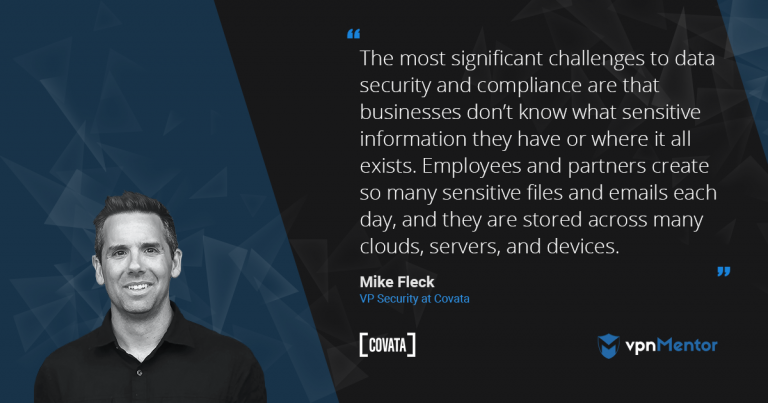Covata – Military-Grade Cybersecurity (Advanced Solutions)
- Tell us about Covata and how you got involved in data security?
- There are many different types of data security products on the market. What is unique about Covata?
- What are Covata's primary products and services?
- What value do you provide clients/customers?
- Can you discuss the types of clients you work with?
- What are the issues that Covata deals which affect smaller businesses and even individuals?
- Let’s take a step back for a moment. What do you see as the most significant challenges to data security and compliance?
Getting the top-level security is a must for many organizations in an increasingly complicated cyberworld. Using experience garnered from military-grade security solutions in the Australian Department of Defense, Covata has created unique solutions to deal with the myriad threats in play. Mike Fleck, Covata’s VP Security, talks about cybersecurity concerns of small businesses and today’s most significant data security and compliance challenges.
Tell us about Covata and how you got involved in data security?
Covata got its start developing a solution for the Australian Department of Defense to enable secure battlefield communications. The resulting technology was a very powerful and secure approach for end-to-end encryption of data, with identity-based encryption keys. Basically, information is always encrypted and it can only be decrypted by authorized users, not someone who happens to intercept the data or who breaks into the system where the information is stored. We adapted that technology to build a very secure yet usable enterprise file sync and sharing solution (think basic services like Dropbox but with superior features and military-grade security). More recently we’ve noticed the need to apply these data security concepts to any data, anywhere it resides.
There are many different types of data security products on the market. What is unique about Covata?
Yes, indeed. The security space has thousands of security products across hundreds of niches. Differentiation is critical for suppliers and the people who buy those solutions. At a high level, Covata is unique in that our technology integrates several data security solutions into a single platform without compromising quality. Our data discovery and automated classification engine is more mature than most of the stand-alone competitors. Our encryption and key management is more scalable and ‘modern’ than traditional data-at-rest encryption vendors. Our access governance capabilities are superior because they are natively integrated with encryption, even controlling access by privileged IT administrator accounts.
From a philosophical standpoint, Covata stands out due to its unwavering dedication to providing practical solutions that effectively address the current challenges in data security and management. While the security industry frequently introduces untested methods to tackle future problems, Covata recognizes the pressing need to address the present, fundamental issues that chief information security officers are still grappling with.
What are Covata's primary products and services?
Covata currently provides enterprise solutions for data discovery, automated data classification, file encryption, access governance and activity monitoring. Our products help businesses and governments find and secure their sensitive files no matter where they reside. While these capabilities can be delivered as a platform, we do have distinct, tailored solutions for certain use cases. For example, SafeShare is the subset of our platform that provides highly secure but usable Enterprise File Sync and Share (EFSS) services. CipherPoint Eclipse is the subset of our platform that secures information in SharePoint, file servers, and Office 365.

What value do you provide clients/customers?
Like all, or at least most, security companies, Covata helps clients reduce the risk of a data breach or privacy violation. Unlike most security companies, Covata also helps to increase business efficiency and productivity. Data classification, for example, enables all kinds of positive business outcomes such as repeatability and improved quality of business processes. Secure file sharing allows businesses to achieve worker productivity gains through collaboration, but for use cases often thought to be too sensitive to allow easy sharing of information internally and externally.
Can you discuss the types of clients you work with?
Our solutions are in use by government agencies, large businesses and small businesses around the world. The issues our products solve are felt by most organizations, across multiple industries. Having said that, most of our customers are large enterprises in financial services, healthcare, and insurance.
What are the issues that Covata deals which affect smaller businesses and even individuals?
Small businesses have many of the same security concerns as the larger enterprises and governments agencies, but often lack the budget and personnel to purchase and administer complex enterprise systems. So, many security solutions either don’t get installed or don’t get properly operated due to complexity.
At Covata, we don’t expect our customers to become experts in machine learning, cryptography, etc. Our solutions are easy-to-use and deploy, and allow our customers to focus on their core business rather than focus on administering our solutions. This is incredibly valuable for small businesses that need high-quality solutions that they can both purchase and operate cost-effectively.
Let’s take a step back for a moment. What do you see as the most significant challenges to data security and compliance?
Great question! The most significant challenges to data security and compliance are that businesses don’t know what sensitive information they have or where it all exists. Employees and partners create so many sensitive files and emails each day, and they are stored across many clouds, servers, and devices.
Compliance with the EU’s upcoming General Data Protection Regulation (GDPR) has caused many executives to realize they can’t possibly manage their responsibilities according to GDPR unless they understand where personal data exists – always and in all places. Many existing data security technologies, like network data loss prevention, aren’t adapted to the new ways that users work (i.e. using Software as a Service and other cloud services).




Please, comment on how to improve this article. Your feedback matters!